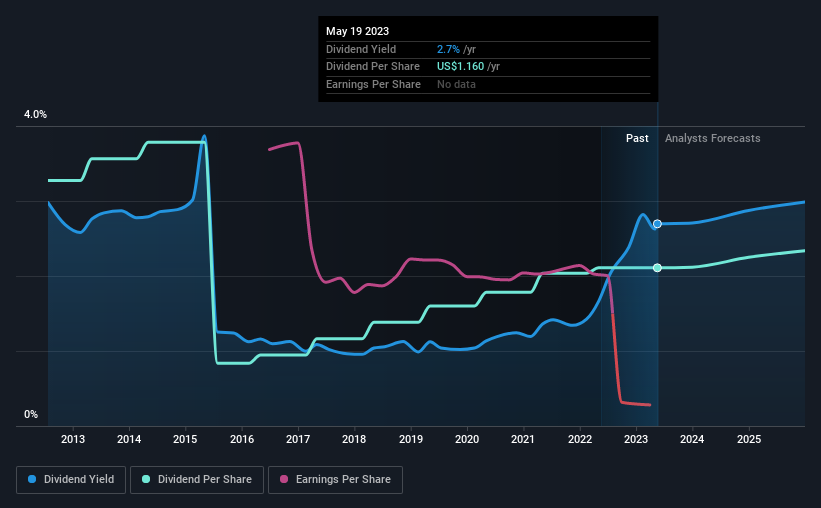Baxter International's (NYSE:BAX) Dividend Will Be $0.29
Baxter International Inc. (NYSE:BAX) will pay a dividend of $0.29 on the 3rd of July. Based on this payment, the dividend yield on the company's stock will be 2.7%, which is an attractive boost to shareholder returns.
See our latest analysis for Baxter International
Baxter International Is Paying Out More Than It Is Earning
While it is great to have a strong dividend yield, we should also consider whether the payment is sustainable. Even while not generating a profit, Baxter International is paying out most of its free cash flows as a dividend. Generally paying a dividend without making profits isn't a great idea and we are also worried that there is limited reinvestment into the business.
Over the next year, EPS is forecast to expand by 123.1%. If the dividend continues on its recent course, the payout ratio in 12 months could be 117%, which is a bit high and could start applying pressure to the balance sheet.
Dividend Volatility
While the company has been paying a dividend for a long time, it has cut the dividend at least once in the last 10 years. Since 2013, the annual payment back then was $1.80, compared to the most recent full-year payment of $1.16. The dividend has shrunk at around 4.3% a year during that period. Declining dividends isn't generally what we look for as they can indicate that the company is running into some challenges.
The Dividend Has Limited Growth Potential
Given that the dividend has been cut in the past, we need to check if earnings are growing and if that might lead to stronger dividends in the future. Over the past five years, it looks as though Baxter International's EPS has declined at around 38% a year. A sharp decline in earnings per share is not great from from a dividend perspective. Even conservative payout ratios can come under pressure if earnings fall far enough. However, the next year is actually looking up, with earnings set to rise. We would just wait until it becomes a pattern before getting too excited.
The Dividend Could Prove To Be Unreliable
In summary, while it's good to see that the dividend hasn't been cut, we are a bit cautious about Baxter International's payments, as there could be some issues with sustaining them into the future. The track record isn't great, and the payments are a bit high to be considered sustainable. We would be a touch cautious of relying on this stock primarily for the dividend income.
Market movements attest to how highly valued a consistent dividend policy is compared to one which is more unpredictable. Still, investors need to consider a host of other factors, apart from dividend payments, when analysing a company. Just as an example, we've come across 2 warning signs for Baxter International you should be aware of, and 1 of them can't be ignored. Looking for more high-yielding dividend ideas? Try our collection of strong dividend payers.
Have feedback on this article? Concerned about the content? Get in touch with us directly. Alternatively, email editorial-team (at) simplywallst.com.
This article by Simply Wall St is general in nature. We provide commentary based on historical data and analyst forecasts only using an unbiased methodology and our articles are not intended to be financial advice. It does not constitute a recommendation to buy or sell any stock, and does not take account of your objectives, or your financial situation. We aim to bring you long-term focused analysis driven by fundamental data. Note that our analysis may not factor in the latest price-sensitive company announcements or qualitative material. Simply Wall St has no position in any stocks mentioned.
Join A Paid User Research Session
You’ll receive a US$30 Amazon Gift card for 1 hour of your time while helping us build better investing tools for the individual investors like yourself. Sign up here

 Yahoo Finance
Yahoo Finance 
